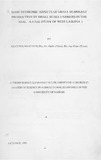| dc.description.abstract | It is estimated that 82% of Kenya's population is living in the rural areas (GOK •
1991 P 2), mainly as small scale farmers. Those (the small scale farmers) in the
ASAL have to depend a lot on livestock production for their household income.
As their farms are small, and their capital bases are low, many of these small
scale farmers depend a lot on small ruminant production as a source of
household income. Therefore, this study looked at some of the important
socioeconomic aspects that affect decisions in small ruminant production
enterprises in West Laikipia, and the contribution of these enterprises to
household income and net farm income.
The secondary data for this study were from Laikipia Research Programme and
Ministry of Livestock Development, and to a lesser extent, from other Ministries. ,
Primary data, on the other hand, were from a survey of 65 small scale farmers in
Salama and Muruku,in West Laikipia.
Descriptive and cross tabulation methods were used in data analysis. The results
of the study revealed that small scale farmers preferred sheep to goats; they
outnumbered goats by 2:1. The study found that small ruminant production was
an significant source of household income; small ruminant production was one of
the two most significant sources of household income. The study also found that
one third of the household income was contributed by income from small
ruminant production. However, small ruminant production was hampered by
disease and lack of water. At the same time, it received very little extension
advisory service from Ministry of Livestock Development.
Therefore, the current study recommends firstly, that projects on small ruminant
production, and especially those that will promote sheep production, should be
initiated in order to improve the productivity of small ruminant production
enterprises. Secondly, extension advisory servrce of Ministry of Livestock
development needs to be improved. ..
Finally, small scale farmers did not consider insufficient grazing to be a major
problem because of the grazing available in the unoccupied farms. Nevertheless,
nutrition is an area which needs to be addressed by the Ministry of Livestock
Development, because grazing area will continue to diminish as the unoccupied
farms in the study area are settled. | en |

